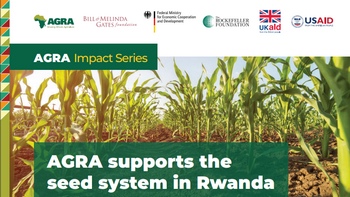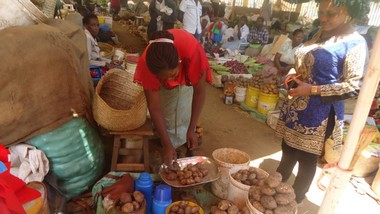AGRA seeks to catalyze inclusive and sustainable Agriculture Transformation that transforms smallholder agriculture into a highly productive, efficient, competitive and sustainable system. According to the 2008 World Bank Development report, increased productivity in smallholder agriculture is acknowledged as an essential element and starting point for agricultural transformation.
However, to ensure inclusive and sustainable transformation, national governments and continental bodies are critical. Effective governance, policies and institutions can catalyze and accelerate the food and agriculture systems transformation required to reach any goal of sustainably reducing hunger, malnutrition, and poverty.
They are crucial in ensuring that countries invest strategically in their own development, strengthening the private sector enabling environment, and building evidence-based participatory processes that will advance inclusive and sustainable agriculture-led growth, resilience, and nutrition.
The Comprehensive Africa Agriculture Development Programme (CAADP) has become a point of reference and framework for Africa’s agriculture and has been lauded for placing the sector back on national governments’ political and policy agenda. However, its major challenge, (according to various studies such as the Sustaining the CAADP Agenda strategic review, AGRA’s Institutional Capacity Assessment, 2019) is weak institutional capacities to deliver the needed services, sector coordination; unpredictable markets and absence of specific policy reforms to promote investments and create enabling environment in the sector.
There is convincing evidence from multiple studies showing that African agricultural institutional systems and arrangements are weak and underpinned by policy biases, uneven political commitment and/or vested political interest in current sector ‘status quo’. Further, they are plagued with uneven understanding of transformational potential of the sector and/or shifting ideological priorities; underinvestment and mis-investment attributed to inadequate government capacities; inadequate knowledgeable and well incentivized staff to guide implementation strategies; overlapping ministerial mandates leading to lack of implementation clarity and guidance; and, limiting policies, laws and administrative practices.
The heightened attention given to the sector’s national and regional governance structures and practices that would propel increased productivity reflects a concern that growth is hindered by widespread weakness in the institutions responsible for policy and programme/project formulation and implementation. In many cases, the challenges of governance (administrative and institutional) to ensure the implementation of adequate policies, programmes/projects and associated monitoring of service delivery has resulted in incomplete implementation and an under-expenditure of allocated funding itself triggering declining budgetary allocation (from both national treasury and development partners) that leads to poor sector performance.
Government interventions are often perceived to be ad hoc, to lack transparency and be communicated ineffectively, which acts as a disincentive to investment in agriculture, creating a vicious circle of low investment, low productivity and low cross-border trade. AGRA sees the need to build a broad coalition on predictability of government interventions in food markets in order to attract and not displace private sector investment. AGRA and its partners will invest in data and analytics to provide the evidence-base for aligned action under a unified vision of a framework for public private dialogue to promote the necessary government engagement to respond and move to more open, stable and predictable policy environments for regional food trade.
AGRA sees the need to build a broad coalition on predictability of government interventions in food markets in order to attract and not displace private sector investment.
AGRA’s Approach and focus to Policy and State Capability
AGRA’s approach is therefore informed by the consciously focus on national institutions with the goal of building sustainable capacity for systematic and systemic change, based on country-specific economic and political realities. Governments require a lot of concerted support that put in place people, processes and systems that improve the political, institutional and regulatory landscape thus create an enabling business environment to drive and sustain agricultural transformation across the region.
Our approach to state capability and policy is encapsulated in four main areas covering Regional Food Trade and Resilience, Policy & Advocacy, State Capability and the Hub for Agricultural Policy Action (HAPA). These areas are delivered within six key business lines which include:
1
Country Vision, Strategy, Prioritized Plans and flagships: AGRA works with governments and others to ensure a country has a sector strategy aligned to its vision that has a prioritized and costed investment plan, and flagship programs to drive the sector growth – Deliberate prioritisation
2
Enabling Policy Environment: AGRA supports governments to articulate alternative policy options through analyzing cost & benefits of reform – policy changes based on reliable and relevant evidence – Up-to-date and evidence-based policies
3
Implementation Capacity & Delivery: AGRA works with governments to strengthen their capacity and capability to increase service delivery & execute on commitments made in national sector strategies and investment plans – timely completion of programmes
4
Stronger Sector Coordination: AGRA works with development partners & other sector stakeholders to strengthen intra- and inter-ministerial coordination as well as, strengthen key coordination platforms such as the donor working groups and the agriculture sector working groups – functional sector cooridination
5
Accountability & Partnerships: AGRA works to support governments put in place functional mutual accountability frameworks to recognize & appreciate performance of their agricultural sector against key commitments agreed upon especially the Malabo Declaration.
6
Strengthen Regional Value Chains: Working with private sector and governments to strengthen value chains and improve market systems. Improving predictability of policies and public-private dialogue to incentivize private sector to increase investment and trade across borders










